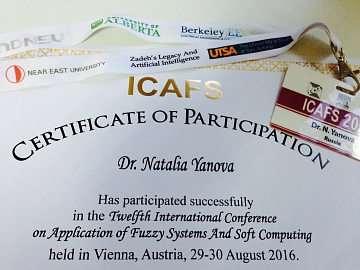The dialogue between psychology and mathematics
 The Twelfth International Conference on Application of Fuzzy Systems and Soft Computing took place in Vienna on 29–30 August. The number of ICAFS 2016 participants was 100 employees from the universities of Europe and America. The only representative of Russia was head of ASU Department of Psychometrics Natalia Yanova.
The Twelfth International Conference on Application of Fuzzy Systems and Soft Computing took place in Vienna on 29–30 August. The number of ICAFS 2016 participants was 100 employees from the universities of Europe and America. The only representative of Russia was head of ASU Department of Psychometrics Natalia Yanova.
From mathematic psychologist’s point of view, exchange of scientific ideas and innovative technologies in the framework of mathematical apparatus in soft computing proves the favorable opportunities for interdisciplinary platforms in leading areas of knowledge engineering.
Thus, 2016 has been a remarkable year for engineers and researchers in the area of fuzzy and unclassical computing theories due to the occurrence of the following events: XIX International Conference on Soft Computing and Measurements (SCM'2016, Saint-Petersburg Electrotechnical University, Russia) and VI World Conference on Soft Computing (WConSC’2016, Berkeley, USA).
Ideas proposed by L. Zadeh, founder of theory of computing with words and perceptions, encourage humane and natural sciences in the area of new arithmetic and cognitive modeling to collaborate. From the psychologist’s position, the most interesting reports of the conference were works on new approaches towards measuring cognitive processes and artificial intelligence, as well as on technologies in the area of expert systems and decision support systems, from theories and methods to instruments and applications.
The report by N. Yanova showed mathematicians’ interest to unclassical psychometrics capabilities in the framework of such theories as Computational Theory of Perceptions (CTP) and Computational Theory of Mind (RTM). Test expert systems of semantic simulation are regarded as promising innovations in measuring mental response.